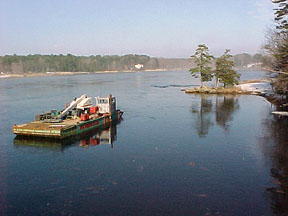Intro
I started a bunch of entries and
then deleted them all. It feels weird to write about
ordinary life. I feel like I should be writing something
really profound and serious but I am at a loss for words.
I read aloud Du Fu's Ballad
of the Army Carts to
anyone who will listen. Poetry is useful for these times.
It compresses the essence of overwhelming feelings and
experience into some kind of manageable
expression.
Meanwhile in ordinary life, some
highlights of last week from the entries that would have
been:
Thursday
Winston got adopted. He's the
adorable and vocal Siamese who inexplicably tested
positive for FIV though he was an indoor cat. Anyway,
he's found a home with no other cats.
I mentioned before that Toby likes
to play. A lot. Actually Toby likes to play so much that
he wears out the volunteers. He begged me to play with
him by leading me to the long string toy he likes and
looking up at me with a pleading look and a plaintive
meow. So I started playing with him. He jumps higher than
any adult cat I've ever seen and with more enthusiasm.
Tony got in on the act too for awhile. It was hilarious
watching old Tony with his street cat looks playing with
Toby. Toby kept playing after Tony wandered away. After
more than 10 minutes of this I was getting quite tired of
waving that string thing around. It's physically
demanding :-). A new volunteer who is developmentally
delayed was washing the dishes but didn't want to wash
the litter boxes. Betsy who had just finished cleaning
the quarantine room offered to wash the litter boxes for
him instead. I piped up, "I'll do them if you'll play
with Toby." So Betsy took over playing with Toby. About 5
to 7 minutes later, Toby has tired out Betsy and she
hands the string over to the new guy. Toby wore him out
too.
Friday
 Another
new ice sound: the sound of ice floes hitting a
barge. Each collision features a hollow ping followed by
a slushy splat and a shushing sound as the ice floe hits
and then slides under the barge.
Another
new ice sound: the sound of ice floes hitting a
barge. Each collision features a hollow ping followed by
a slushy splat and a shushing sound as the ice floe hits
and then slides under the barge.
Another sign of spring: the
barge. It's here to resume work on the bridge now that
the ice is out. You can't really make it out in the
picture but the barge has a URL painted on the side:
www.bridgeriggers.com.
They've got some nice pictures of other bridges they've
worked on at their web site.
Proof that that great blue heron
does move sometimes: when I arrived at the bridge the
great blue heron was perched on the top of a pine tree.
Think he can see fish from up there?
I didn't see any bald eagles from
the bridge but the great cormorants are still
there.
Sunday
G*d's own plenty of scaup are
cavorting in Providence Harbor off Bold Point but do you
think we could find that wily little tufted duck among
them? No such luck. I'm told there were some red necked
grebes among them too but with the sun in my eyes and
everything moving I couldn't spot them.
Colt State Park is still full of
brant and horned larks. What did horned larks do for
habitat before parking lots were invented?
And Today
It's another gorgeous day in the
northeast corner of the world's only
superpower.
I continue to plow through my
collection of whaling memoirs. Sails and Whales
covered the late 19th/early 20th century, when steam
engines began to be used to power the winches and stuff
but most everything else was done the old fashioned way
and New Bedford had already begun to fade from major city
status. Of Whales and Men is about mid-20th
century whaling aboard the Norwegian factory ships with
huge crews (700+ men), modern tools, and differently
quarry (blue whales and finbacks for eating and elephant
seals for oil as opposed to the earlier sperm and right
whales for oil and whalebone). Of Whales and Men
describes South Georgia as the slum of the Southern
Ocean. I guess with all that decaying whale offal
stinking up the place, the gemlike scenery was lost on
the men. Also, the elephant seals are much more scenic
and beautiful alive than in try pots being turned into
seal oil. Oh, and by this time in whaling history New
Bedford had turned to textiles, which were about to
decline too. The writer speaks of New Bedford as one
speaks of ancient Rome or ancient Athens: a place that
was once important in history and where the museums and
ruins still tell the story.